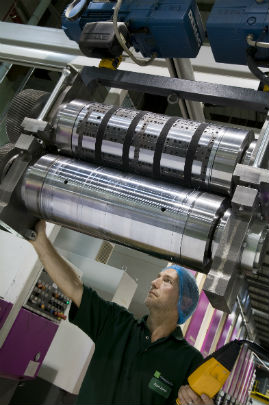Plain and simple – packaging is important

Plain packaging of tobacco products has the potential to significantly damage the packaging industry with no proof that it will result in a reduction of smokers. Here, Mike Ridgway discusses his role as a spokesperson for the packaging industry.
15 November 2013

The size of the machines is an indicator of the scale and investment required in print equipment for tobacco packaging
Mike Ridgway has worked in the UK packaging industry for over 40 years. Soon after retiring from the position of managing director at Weidenhammer Packaging, the plain packaging debate began and he was asked to return in an advisory role. A number of packaging companies; Weidenhammer Packaging Group, Payne, Parkside Flexibles Group, Chesapeake, and the API Group came together to discuss the serious implications plain packaging would have for their industry. Mike Ridgway was appointed as spokesperson for the group to highlight how the sector would be impacted.
Packaging and the UK
In the UK, the packaging industry is a very important sector with over 60,000 employed. "There are a lot of different elements that make up cigarette packs; inserts, wrapping, design, print, equipment and distribution, as well as specialist fields and skills," says Ridgway. "It is an extensive supply chain that would suffer a massive blow with the introduction of this legislation."
Since discussing it over the last two years, the British government has decided it needs more time to see if the legislation works and is waiting for firm evidence from Australia. This is a positive move from the packaging industries stand point. Ridgway believes "changing packaging does not work". He adds: "I hold a strong view that there is a serious connection between smoking and health. There is a problem, but if you want to combat the number of smokers it should be done through other methods like education."
The Irish context
Ireland’s packaging industry is not directly involved with tobacco. Even still, from an Irish perspective, plain packaging is just as important for two reasons. Firstly, there is a significant problem with counterfeit and illicit product. Ridgway explains: "Plain packaging legislation will make it very easy for anyone to print cigarette packets. Any previous deterrents such as embossing, raised print or box shape will no longer be an issue for criminals. It is well accepted that sophisticated packaging acts as a deterrent and the removal of debossing, bossing or ridged edges is inviting more criminals to get in on the opportunity."
Secondly, legislation in the tobacco industry has, in the past, lead to the introduction of legislation in other industries. If this draconian way of legislating is introduced to alcohol and other food items it would impact severely on Ireland’s packaging groups involved in the food and drinks sector. Although this could be viewed as a leap, legislation first introduced for tobacco is often put in place for other products. In Australia, there are already calls for health warnings and plain packaging to be brought in for other products. Simon Chapman, a supporter of Australia’s plain packaging campaign, has spoken out in favour of graphic warnings on alcohol as has the British Medical Association. The Irish Medical Organisation has also petitioned the government to introduce explicit health warnings on alcohol products.
The situation at present
All the decisions being made about plain packaging have been subjective. Ridgway notes: "Most countries are holding back on introducing this legislation to firstly determine if it has the desired or any effect on smoking rates. But another important reason for holding back is the current case that has been brought against the Australian government by the World Trade Organisation (WTO). These cases can take years to go through but if Australia is found in breach of trading laws there could be serious financial implications."
A lot of countries, such as Britain, have had the foresight to wait to determine the next best step once all the elements have been considered. Minister Reilly however, seems to want to push forward regardless of potential implications. Japan International Tobacco (JTI) has already indicated it would be ready for a fight should its intellectual property rights be infringed. This fight could prove very costly for the Irish government. Billions of compensation will have to be payed by the Australian government should the WTO rule in favour of the tobacco companies.
Minister Reilly is taking a big risk with taxpayers’ money on subjective and paltry information. "In the UK, it’s now off the political agenda until 2015," says Ridgway. He adds: "The Irish government should allow for a proper debate before this is pushed through, we are not against regulation. What we are looking for is effective regulation, not just regulation introduced for the sake of it."



 Print
Print






Fans 0
Followers